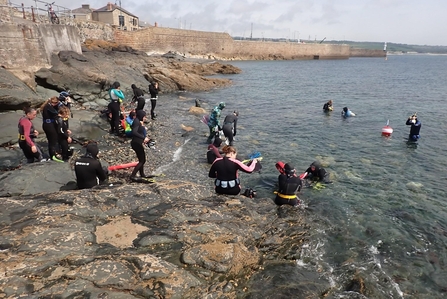Seasearch Diving
Seasearch is a national project for volunteer divers and snorkellers who have an interest in what they see underwater, who want to learn more, and who want to help protect the marine environment.
Cornwall Wildlife Trust is responsible for coordinating all Seasearch activities in the county.
The aim of Seasearch is to record marine habitats and species found around our coast and to use the information to identify sites of specific conservation concern. The data collected helps us with our conservation work and raises public awareness of the value of our marine environment.
Once you are qualified as a Seasearch Observer, any dive or snorkel can be a Seasearch record; you just fill in a simple form and send it to us!
How you can get involved
Seasearch is a national project set up by the Marine Conservation Society and coordinated in Cornwall by Cornwall Wildlife Trust. We have a network of qualified divers and snorkellers who participate in organised surveys and complete and send in Seasearch forms from their own recreational adventures.
Would you like to be kept up to date with the project, including details on upcoming training events and organised surveys? Click here to add your name and email address.
For more information, please email seasearch@cornwallwildlifetrust.org.uk.
If you are a qualified diver, free diver or experienced snorkeller, we want to hear about the marine life you see on your dives!
Seasearch is fun
It is great to dive with like-minded people interested in marine wildlife. Many Seasearchers are keen underwater photographers, and seasearch is a fantastic way to improve marine species identification and knowledge while making new friends and having fun!
Seasearch is important
The information recorded since Seasearch was founded in the mid 1980s has been a vital tool for our marine conservation work. Without this essential work, we would have far less knowledge about our coastal marine life. Data is used to monitor changes driven by climate change, the introduction of non-native marine species, and the effects of plastic pollution, fishing, and other human activities on the environment. Seasearch data has been a driving factor in the newly expanded network of Marine Protected areas designated around our coasts, and many of these sites would not have been established without the data collected by seasearch volunteers. Increasingly, the work of seasearch will be vital in monitoring the effectiveness of the management of these areas.
Visit www.seasearch.org.uk for much more information on the National Seasearch programme.
Have you seen a Crawfish? Please tell us!
Crawfish (Palinurus elephas) are a species becoming more abundant around our coasts despite years of decline. If you see one, please let us know! We are very keen to monitor the return of this species that was over-fished in Cornish waters in the 1980s and is now making a welcome return. Please record the location and details, fill in our form and email it to us!
Click here for instructions on filling in the crawfish recording form or access the editable crawfish recording form.
In spring 2019, we launched our #HandsOffOurCrawfish campaign. We are asking divers to pledge not to collect crawfish on their dives; boat skippers, dive clubs and dive schools are signing up, and stickers are being put on dive boats to warn divers not to collect these fantastic animals. For more info, visit our Crawfish project page.
Any dive or snorkel can be a Seasearch survey!
Remember, if you head for a dive or snorkel in your own time, you can always pop your sightings into a form and send it in. You do not have to be at an organised event to complete Seasearch surveys. The training course highlights how to ID and record the habitats and wildlife you encounter, so you'll be equipped to survey at any dive or snorkel you do.
Qualifications and experience
Cornwall Wildlife Trust organises a programme of dives and snorkels each year. To train as a Seasearch snorkeller or free diver, you need to be a strong swimmer who is confident and experienced at snorkelling/freediving in the UK. You must be able to confidently swim at least 200m with fins, snorkel, mask, and wetsuits. To take part in the scuba dives, you need to meet our safety minimum requirements;
- Be aged 18 or over.
- Divers should be qualified to the level of BSAC Sports diver, PADI Rescue diver or equivalent.
- Have recent experience in cold water diving, including a minimum of 20 logged dives, 10 of which should be in the UK and 2 of which should be within the last six months.
- Have your own dive gear or rent dive gear, which must be serviceable and within the test date.
- Have a current diving medical or self-certification declaration
- Have third-party liability diving insurance.
- Be fit on the day and fully able to participate.
Watch This Space! Future Events Coming Soon
If you have any questions, please email seasearch@cornwallwildlifetrust.org.uk

Matt Slater
Photo credit Matt Slater.
Seasearch Cornwall (https://www.youtube.com/watch?v=wLTNDPDlsAY)
Video filmed and edited by Finn Crouch.
